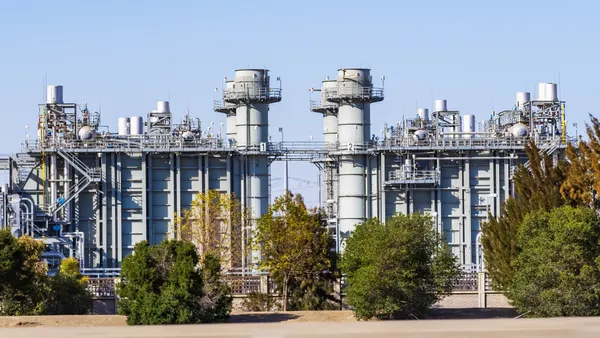Dive Brief:
- Exelon is revising its 2020 full-year earnings guidance range from $3 to $3.30 per share to $2.80 to $3.10 per share, Chief Financial Officer Joseph Nigro said Friday during the company's Q1 earnings call.
- Nigro cited the impacts of COVID-19, warmer than usual winter weather and lower distribution ROEs for Commonwealth Edison. Exelon expects commercial/industrial load to decline 9% to 15% and residential load to increase 4% to 7% in Q2, depending on the region, with both trends subsiding as the year goes on.
- Each of Exelon's utilities "is working with ... regulators on COVID-19 cost and bad debt recovery mechanisms where" they don't have them, Nigro said. In addition, the company has seen COVID-19 diagnoses for 102 employees and 25 contractors, with 82 of those back at work, CEO Chris Crane said.
Dive Insight:
Such a change in full-year earnings guidance so early in the year is not typical, Nigro noted, but Exelon wanted "to provide a complete picture of where we stand at this point in the year and include our best estimates of the COVID-19 impacts," he said.
"In developing our revised guidance range, we looked at the load and economic data we were seeing in April, talked to our customers about their expectations for the year and considered different economic outlooks," he added.
A number of assumptions and sensitivities underlie the revised guidance, including stay-at-home orders and widespread business shutdowns through mid-June, with load gradually recovering in subsequent months, Exelon said in its Q1 earnings call presentation. By Q4, it expects commercial and industrial load to be down 2% to 6% and residential load to be down 0% to 2%.
Exelon's overall load experience mirrors that of other utilities around the country, though Wood Mackenzie reported significant regional variations last month. However, the financial structure of some of Exelon's subsidiaries reduces the financial impact of the load shifts.
Some 70% of the company's utilities are decoupled, with their revenues not subject to load fluctuations. "The majority of volumes that are non-decoupled utilities, PECO, Atlantic City Electric and Delmarva, Delaware, are commercial industrial customers," Nigro noted.
For COVID-19-related impacts, Nigro said Exelon expects "to be able to offset the impact of lower loads at [its] non-decoupled utilities through cost reductions and the assumption that [its] regulators allow for timely recovering of expected higher bad debt."
Each of Exelon's utilities is working with "regulators on COVID-19 cost and bad debt recovery mechanisms where we do not have them," including in n Delaware, New Jersey and Pennsylvania, Nigro said.
In addition, last month, the public service commissions in Maryland and Washington, DC, "issued orders to authorize a regulatory asset that tracks prudent COVID-19-related costs incurred, which will allow for an assessment of recovery of incremental bad debt or atypical costs related to the pandemic," Nigro added.
To deal with the financial impacts from COVID-19 and other negative factors, Exelon has also identified $250 million in cost reductions and is lowering 2020 capital expenditures by $125 million at its ExGen subsidiary.
Despite the near term challenges, Crane said Exelon is maintaining a 6% to 8% earnings per share growth rate projection for its utilities through 2023.
"As you can imagine, as you would expect, we look at multiple scenarios. And if the economy continues to degrade, impact on customers, whatever it could be is out in the future. The plans can be adjusted," Crane said.
"But at this time, we don't plan on adjusting. We plan on continuing to do the much needed reliability and efficiency modifications and prepare the system for the onset of much more distributed and renewable energy coming on. It won't be able to happen if we don't make the investments and facilitate it," he continued.
The company reported adjusted operating earnings of $0.87 per share for Q1 2020, same as in Q1 2019 and $0.02 per share below expectations. Q1 revenue was $8.75 billion, down 7.7% year-on-year and $74.5 million below expectations, according to Seeking Alpha.














